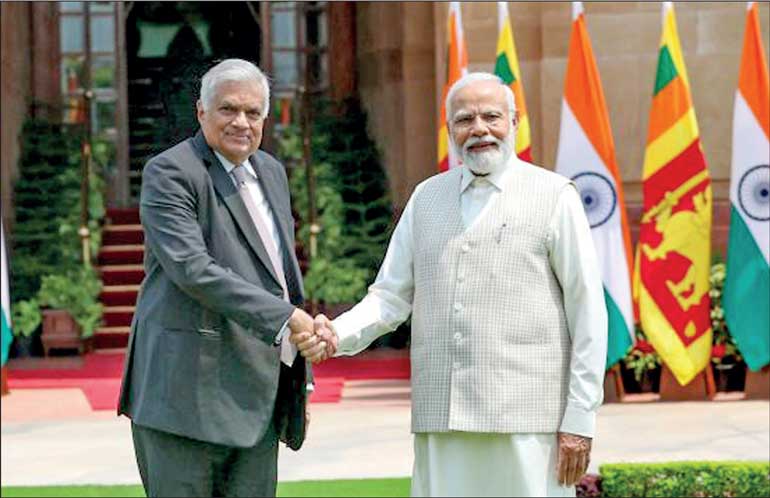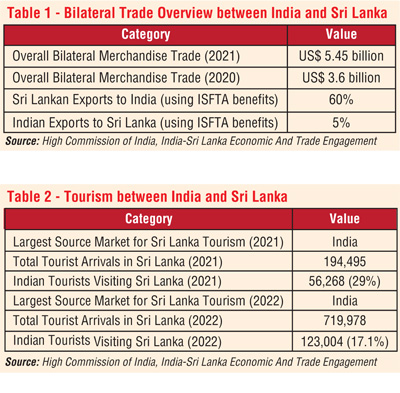Monday Feb 16, 2026
Monday Feb 16, 2026
Friday, 2 August 2024 00:20 - - {{hitsCtrl.values.hits}}

The evolving economic ties between India and Sri Lanka present significant opportunities for growth and collaboration
 Sri Lanka’s recent economic turmoil and recovery efforts present a complex narrative marked by internal challenges and external macroeconomic shocks. The economic crisis disrupted the financial landscape, leading to significant international involvement, mainly through the International Monetary Fund (IMF) and strategic partnerships with neighbouring countries like India.
Sri Lanka’s recent economic turmoil and recovery efforts present a complex narrative marked by internal challenges and external macroeconomic shocks. The economic crisis disrupted the financial landscape, leading to significant international involvement, mainly through the International Monetary Fund (IMF) and strategic partnerships with neighbouring countries like India.
India’s participation in Sri Lanka’s recovery process underscores its economic and strategic interests in the island nation. As the first bilateral creditor to provide financial assurances to the IMF, India was crucial in facilitating Sri Lanka’s bailout program. This financial support, totalling around $ 4 billion, included multiple credit lines and currency support, highlighting India’s commitment to regional stability amid Sri Lanka’s economic downturn.
Beyond financial assistance, India emphasised diplomatic engagements to foster long-term development in Sri Lanka. Indian Foreign Minister S. Jaishankar has highlighted investments in critical energy, tourism, and infrastructure sectors. India views its relationship with Sri Lanka through economic, strategic, and cultural lenses, encompassing political cooperation, trade, and defence collaboration. Sri Lanka’s geographical position in the Indian Ocean is pivotal to India’s security strategy, countering Chinese influence in the region.
In the contemporary era of globalisation, economic partnerships and bilateral trade agreements are essential for fostering growth and stability. India and Sri Lanka, with their deep historical and cultural ties, stand at a strategic juncture to enhance their economic relationship and address mutual challenges. Key areas of collaboration include economic cooperation, trade facilitation, investment promotion, skill development, maritime security, disaster risk reduction, and infrastructure development. Additionally, India’s “Neighbourhood First” policy reflects its commitment to fostering a stable, secure, and prosperous regional environment, emphasising peaceful co-existence and mutual economic interdependence with a focus on India-Sri Lanka partnerships.
Economic cooperation and shared prosperity
India and Sri Lanka have enjoyed robust trade relations, significantly bolstered by the Free Trade Agreement (FTA). This agreement has increased bilateral trade and strengthened people-to-people ties and regional stability. In 2021, the bilateral merchandise trade stood at $ 5.45 billion, ranking India as Sri Lanka’s top trading partner. Enhancing physical and digital connectivity is crucial for increasing trade and commercial cooperation. India’s expertise in infrastructure development can significantly aid Sri Lanka’s initiatives, improving logistics and transportation. This collaboration can stimulate regional economic growth, as better connectivity facilitates smoother trade and commerce.
Infrastructure development, particularly in logistics and transportation, offers substantial opportunities for collaboration. India’s expanding infrastructure capabilities can support Sri Lanka’s projects, enhancing regional connectivity and easing commerce. This is critical, especially considering the impact of the COVID-19 pandemic on Sri Lanka’s GDP, which shrank by 3.6% during the general lockdown.
Tourism, agriculture, manufacturing, and technology are sectors with significant trade and investment cooperation potential. For instance, India’s expertise in medical tourism can bolster Sri Lanka’s healthcare sector, providing mutual benefits. According to the Medical Tourism Index 2020–2021, India is ranked 10th globally and third in Asia, highlighting its potential to support Sri Lanka in this domain.
India and Sri Lanka have shown financial resilience and development initiatives that can serve as a model for the Global South. According to the World Bank, severe global poverty rates have decreased significantly, primarily due to economic growth in developing nations. However, economic inequality, talent mismatches, and regional disparities remain. Collaborative efforts in economic policy-making can address these challenges. Both countries can ensure inclusive growth by promoting fiscal discipline, investing in infrastructure, and supporting small and medium enterprises (SMEs). Regional trade agreements and shared infrastructure projects can further stimulate economic growth.
 Maritime security and disaster risk reduction
Maritime security and disaster risk reduction
Due to their strategic location in the Indian Ocean, India and Sri Lanka play crucial roles in sustainable ocean resource management. Collaborative efforts in this area can enhance maritime security, promote sustainable fishing practices, and protect marine biodiversity. Overfishing, marine pollution, and climate change are significant challenges that can be addressed through joint research, capacity-building programs, and the enforcement of maritime laws. By working together, the two nations can develop and implement innovative technologies and practices for monitoring and managing marine resources, thus ensuring their sustainability.
Cooperative patrols, information-sharing protocols, and capacity-building programs can enhance maritime security. Additionally, establishing marine protected areas and adopting sustainable fishing methods can ensure the long-term health and productivity of marine resources. Joint initiatives can also focus on restoring degraded marine habitats and rehabilitating coral reefs, which are vital for the ecological balance and biodiversity of the region. Through these collaborative measures, India and Sri Lanka can safeguard their marine environments and support the livelihoods of coastal communities that depend on these resources.
Envisioning a sustainable future
India and Sri Lanka share a commitment to environmental sustainability. Collaborative efforts to address climate change, protect marine ecosystems, and promote renewable energy can lead to a greener future. Joint waste management, disaster preparedness, and sustainable agriculture initiatives are critical for this endeavour. Collaboration is essential in promoting climate resilience and sustainable development. Public-private partnerships, civil society involvement, and international cooperation can drive significant progress. By sharing knowledge and resources, India and Sri Lanka can develop effective strategies to combat climate change and promote sustainable economic growth.
Finally, the evolving economic ties between India and Sri Lanka present significant opportunities for growth and collaboration. Strengthening maritime security, promoting digital integration, and leveraging soft power diplomacy are crucial for building a robust economic partnership. As India and Sri Lanka navigate these opportunities and challenges, their collaboration can serve as a model for regional stability and economic progress.
(Soumya Bhowmick is Associate Fellow at ORF, India, and Nilanjana Das is attached to Department of Economics, Jadavpur University, India.)